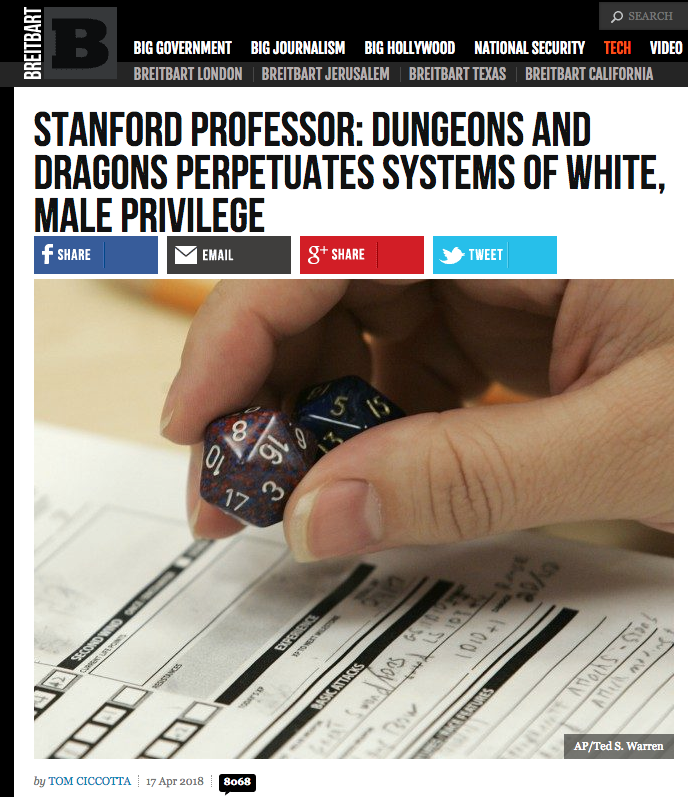Earlier this week, my work was written up on an alt-right website:

That article and various reddit threads about it have garnered thousands of not-so-friendly comments. Not surprisingly, my inbox has been filled with a handful of nasty messages the last few days as well.
I’m not entirely sure why this happened now: the article described in that headline came out a year ago (it can be found here and I have talked through the paper in a handful of streamed presentations that also now have many unkind comments added to them). In case you’re wondering, I’m fine. Really. I think I got worse blowback a few years ago. As a bit of perspective, though, it might be worth offering a bit of an origin story to this work.
Why Study Dungeons & Dragons?
It is fitting that I actually started studying tabletop roleplaying games because of the violence and discrimination that women, people of color, and members of the LGBTQ+ community experienced in video gaming culture. (The good reads on Gamergate are here and here and a segment of Reply All heard here.)
There’s a real conflict in educational research on games that persists today. Much of my doctoral work looked at the liberatory possibilities of games in the lives of the young people I was teaching and working with. As I continued to dig into the literature on games and learning, most of the key studies focused on video games. However, studies that praise the possibilities of games and learning tend to look blindly past the broader culture around gaming, issues of exclusion, and the cultural role these games play. (I write a bit about this in my chapter in this recent book.)
My hypothesis was that it would be harder for gaming culture to so openly reject the lives and experiences of some players if anonymity was removed and play happened face to face in analog gaming environments … like Dungeons & Dragons.
To be absolutely clear, I had only positive interactions with the participants and friends I was privileged to learn from in my two years of ethnographic research as part of this work. The article in question, though, points to how the mechanisms that led to Gamergate can be seen embedded in the systemic designs of the earliest editions of the first roleplaying game. In some ways it feels like coming full circle: I moved away from digital gaming research because of the negative culture attached to it, only to end up experiencing the brunt of it as a result (admittedly, a somewhat crowded inbox is nothing compared to the experiences of many Gamergate victims).
This is not all gloom and doom, though. There are an amazing variety of games (digital and non), designers, fans, and players interacting in a thriving and inclusive ecosystem today. The resilience of a minority of players that feel threatened by critique, by diversity, by change parallels broader resistance to progressive social change throughout history. Fittingly, as I write this, I am also in the midst of research tied to empathy, care, and healing in the lives of students and teachers.
At their best, tabletop roleplaying games imagine worlds unseen; they can spark revolutionary civic thought in the collaborative narratives of players around a table. Preparing the next manuscript tied to this work, I am excited to push for alternative worlds and possibilities in schools, in cultural contexts, and in the lives of players.
Pingback: In difesa di Antero Garcia: perché D&D non è (più) razzista - Player.it
Pingback: Episode Two: Antero & the Trolls | A More Civil Discourse